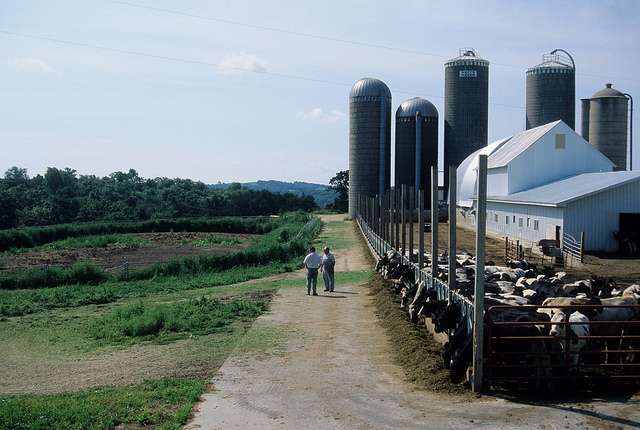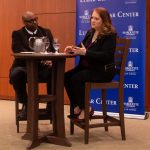Assembly Stalls on Farm Crisis Legislation
Despite bipartisan movement, the bills never saw a special session.

Dairy farm. Photo from the Wisconsin Department of Natural Resources (CC-BY-ND).
A package of bills aimed at relieving the dairy farm crisis ended the day Tuesday all dressed up with no place to go.
Meeting at 8:30 on Tuesday morning, the Assembly Agriculture Committee took the unusual step of holding a vote immediately after public hearings on seven bills — acting on the apparent assumption that before the end of the day, the full Assembly would convene the special session that Gov. Tony Evers called in January to address the mounting problems facing farmers — especially dairy farmers.
Evers offered eight bills late last month to take up, and on Monday Assembly Republicans put out five bills of their own and put just two of the Evers bills on the committee’s calendar for Tuesday, one of which the Republicans rewrote entirely.
But while the public hearing and subsequent vote on the measures signaled a relatively low-key outcome in the full Assembly — that never came.
Six of the seven bills passed the committee unanimously Tuesday morning. The exception was AB-876, requiring the University of Wisconsin-Madison to produce a research study on development of an agriculture science and technology program.
“I want to ask someone to tell me what exactly this bill does, how this bill will help us move forward on those immediate needs” farmers have, state Rep. Debra Kolste (D-Janesville) said before casting the lone “no” vote on the measure. “I think the university already does this.”
The greatest disagreement arose in the vote to replace Evers’ version of a dairy industry export development program with the Assembly GOP’s version.
The Evers bill, Special Session AB-6, would have provided $1 million in the current two-year budget and added two positions to the state Department of Agriculture, Trade, and Consumer Protection (DATCP) to collaborate with the dairy industry in boosting exports to 20% of the U.S. milk supply by 2024.
Through a substitute amendment, Republicans instead called for DATCP and the Wisconsin Economic Development Corp. (WEDC) — with no new funding now — to team up on developing a program by the end of 2020 to raise milk exports to 20% of the U.S. milk supply by 2026, while also raising exports of crops and meat products with an unspecified target by that same date. The two agencies would then be required to submit funding proposals for the program for up to $5 million in the 2021-23 budget cycle.
Public hearing testimony didn’t focus on the Republican rewrite, although in his testimony DATCP Deputy Secretary Randy Romanski alluded to that version’s lack of current spending.
With 10% of the state’s dairy processors currently exporting some of their wares, “we’ve got some opportunity here,” Romanski said.
Later in the hearing he addressed the legislators directly: “We look forward to all of you to move this industry along. That’s why it’s important to get this funding now in this biennium. We look at it as an investment in the agricultural industry.”
Asked about the substitute amendment in a brief interview outside the hearing, Romanski reiterated that point: “It’s really valuable to make these investments now,” he told the Wisconsin Examiner, observing that the export initiative had been in Evers’ 2019-20 budget until it was removed by the Legislature’s Joint Finance Committee.
DATCP has worked with the agriculture industry where possible to encourage exports. “We are poised for success in a lot of areas,” Romanski said. “Wisconsin is a leader in exporting a lot of [farm] products.”
On the Republican provision that would team DATCP up with the WEDC, Romanski suggested that that approach was consistent with Evers’ approach in government, encouraging agencies to work together. “We partner with the Wisconsin Economic Development Commission on a regular basis,” he said. “We stand ready to do that.”
Considine suggested that Republicans should cut their future $5 million into two parts — $1 million to be spent now and the remaining $4 million for the next budget cycle.
State Rep. Don Vruwink (D-Milton) said he liked the $5 million investment but that he felt DATCP working alone would be more efficient. But while the committee passed the substitute amendment in a partisan 10-5 vote, the members then united to pass the amended bill 15-0.
All the rest of the bills passed the committee unanimously with little criticism, including two tax-break measures (AB-873 and AB-875), another UW study bill focusing on the UW System (AB-874), a bill adding six agriculture specialists to the UW-Madison Extension (AB-627), and an Evers bill (Special Session AB-7) to add more funds to a promotional grant program for dairy processing plants, while tweaking the program to give preference to “smaller” plants — defined in a Republican amendment as those producing less than 50 million pounds of product a year.
Reprinted with permission of Wisconsin Examiner.





















